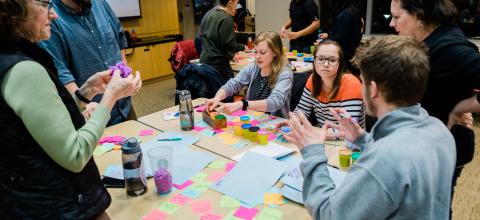About the Food and Bio-Innovation Cluster
The Food and Bio-Innovation (F&BI) Cluster helps students develop as entrepreneurs and innovators in the food, agriculture, bio-renewables, community, ecosystems, and life sciences spaces. Entrepreneurial and innovative action is needed for the wise and sustainable use of biological materials and natural resources (plants, animals, ecosystems, and organisms, etc.) to meet the nutritional, community, material, and energy needs of society. Students select courses in the cluster that complement their personal interests.
Students who complete this cluster develop skills and knowledge in seven areas:
- Identifying and assessing the feasibility of opportunities for entrepreneurism and innovation within food, agriculture, bio-materials, and/or community
- Organizing and marshalling resources to act upon an opportunity with food, agriculture, bio-materials, and/or community
- Developing professional networks, collaborative skills, and work team skills
- Practicing leadership in peer-influence environments, as well as development of skills from leaders in practice and academics
- Using adaptive logic and poise to tap into their own creative abilities with problem solving in high paced/uncertain environments
- Communicating and proactively dealing with conflict and failure, utilizing well-established ethical frameworks and experiencing character development
- Developing understanding and practice with core business concepts used in entrepreneurial, small business, non-profit, and corporate environments.
Preferred Sequence of Courses for the Cluster
| Core Courses #1 and #2 | Credits | Semester |
|---|---|---|
| MGMT/ENTR 215 Entrepreneurial Mindset | 3 | 1-5 |
| ENGR/ENTR 310 Entrepreneurial Leadership | 3 | 3-6 |
| Food and Bio-Innovation Cluster (9 credits) | Credits | Semester |
|---|---|---|
| AgSci 200-300 level course options (3-6 credits) listed below | 3-6 | 3-6 |
| AgSci 400-level course options (must have a minimum of 3 credits) listed below | 3-6 | 3-7 |
| Core Course #3 | Credits | Semester |
|---|---|---|
| MGMT/IST/ENGR 425 New Venture Creation | 3 | 4-8 |
To meet the prerequisite requirement for MGMT/IST/ENGR 425, you must take:
- (ECON 102 or ECON 104 or ECON 14 or MGMT 215; an ECON course is not required for the ENTI minor) and (CAS 100 or CAS 137T or EMSC 100S)
Food and Bio-Innovation Course Options
- 200-level Courses
- AEE 201 Interpersonal Skills for Tomorrow's Leaders
- AG BM 200 Introduction to Agricultural Business Management
- AG BM 220 Agribusiness Sales and Marketing
- ANSC 201 Animal Science
- FD SC 200 Introductory Food Science
- FD SC 206 Improving Food Quality
- HORT 250 Landscape Contracting Design/Build Principles
- 300-level Courses
- AEE 311 Developing Youth Leadership through Organization and Program Structure
- AG 301 Introduction to Agricultural Law
- AG BM 302 Food Product Marketing
- AG BM 308W Strategic Decision Making in Agribusiness
- AG BM 338 Agribusiness in the Global Economy
- AN SC 306 Swine Production and Management
- AN SC 308 Sheep and Goat Production and Management
- AN SC 309 Beef Cattle Production and Management
- AN SC 310 Dairy Cattle Production and Management
- AN SC 311 Poultry Production and Management
- AN SC 324 Value Determination of Meat Animals
- AN SC 327 Horse Production and Management
- AN SC 350 Dairy Problem Solving
- CED 375H Community, Local Knowledge, and Democracy
- E R M 300 Basic Principles and Calculations in Environmental Analysis
- 400-level Courses
- AG BM 407 Farm Planning and Financial Management
- AG BM 408 Financial Decision Making for Agribusiness
- AG BM 440 Food Product Innovation Management
- AG BM 445 AgTech Entrepreneurship
- AG BM 455 Retail Horticulture Business Management
- AG BM 460 Managing the Food System
- AN SC 410 Advanced Dairy Herd Management
- AN SC 429 Advanced Beef Cattle Production
- AN SC 450 Dairy Farm Management Systems
- BRS 402 Foundations of a Sustainable Business
- BRS 429W Biorenewable Systems Analysis and Management
- BRS 437 Biorenewable Bioproduct Marketing and Sales
- CED 417 Power, Conflict, and Community Decision Making
- CED 425 International Community and Economic Development
- CED 430 Principles of Community Economic Development
- ERM/BRS 402 Foundations of Sustainable Business
- E R M 411 Legal Aspects of Resource Management
- E R M 412 Resource Systems Analysis
- E R M 413W Case Studies in Ecosystem Management
- FD SC 411 Managing Food Quality
- FDSC 444 Arguing about Food
- FDSC 460 Food Production in Italy
- FD SC 417 Food Laws and Regulations
- FD SC 430 Unit Operations in Food Processing
- FOR 440 Forest and Conservation Economics
- HORT 410 Issues in Landscape Contracting
- HORT 450 Greenhouse Management
- HORT 453 Flower Crop Production and Management
- HORT/AGBM 455 Retail Horticulture Business Management
- R SOC 452 Rural Organization
- TURF 436W Case Studies in Turfgrass Management


